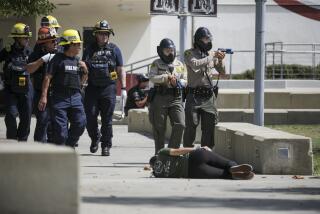Senate Panel OKs Licensing, Tests for Handgun Buyers
SACRAMENTO — A Senate committee voted Tuesday to require California handgun buyers to pass safety tests and be licensed by the state starting Jan. 1, 2003.
Approval by the Senate Public Safety Committee came as Gov. Gray Davis, who declared that he would not sign any major gun control bills last year, sent a signal that he may be softening his stance.
“He’s not closed the door on new [gun] legislation this year,” said governor’s spokesman Roger Salazar. “He’ll evaluate it on its merits. The door is slightly ajar.”
“I’d like to walk through that door,” Sen. Jack Scott (D-Altadena), author of the handgun licensing bill, said before the committee hearing.
SB 52, which would make California one of only a handful of states that require handgun owners to be licensed, cleared the committee on a bipartisan 4-1 vote and went to the Appropriations Committee for another hearing.
Last year, Scott guided a similar handgun licensing bill through the Assembly and Senate but abandoned it one step short of final passage when confronted by a threatened veto from Davis.
“I plan to carry this bill forward,” Scott said Tuesday. “I’m hopeful the governor will sign it.”
In 1998, Davis signed several major gun control bills, including measures that toughened restrictions on assault firearms and cracked down on unsafe handguns.
But he warned that he would accept no expansion of gun controls in 2001 until law enforcement officials had time to implement the new laws and evaluate how well they worked.
Under the latest Scott bill, starting Jan. 1, 2003, hundreds of thousands of handgun buyers would be required to pass a test on gun laws, show they could load and unload a handgun safely and demonstrate competency in firing the weapon.
A license would also be required for people who received a pistol or revolver through a loan, gift, bequest or other transfer. The bill would not apply to casual loans of handguns at a shooting range or on private property.
Sponsored by Handgun Control and the Million Mom March, the bill would make it illegal for a dealer or other owner to sell or transfer a handgun to a person who was not licensed.
Current owners would not be required to obtain licenses unless they acquired more handguns.
The licenses, which would generally would expire after five years, would cost $30 each. In addition, local police and sheriff’s departments, which would fingerprint applicants, could levy a fee of up to $12. Scott said the fingerprinting would deter criminals from applying.
Scott, whose son was killed in an accidental shooting several years ago, called gun deaths a national epidemic, particularly among young people. “I believe this will reduce crime and reduce injuries and death,” he said of the bill.
However, law enforcement officials, whose support is considered crucial to whether the bill becomes law, were deeply split on the bill.
Nick Werner, representing the California State Sheriffs Assn., criticized the plan as “too costly and too burdensome” on local sheriff’s departments, warning that sheriffs would “have to hire people and take officers off the street to administer the program.”
But Los Gatos Police Chief Larry Todd, representing the California Police Chiefs Assn., disagreed.
“We will not be taking police officers off the streets to take thumbprints from people,” Todd testified. He noted that police agencies currently do thumbprint services and could absorb the extra work with existing staff.
A representative of Los Angeles County Sheriff Lee Baca said he supports the bill.
At the hearing, the measure also drew support from a variety of citizen activists, including Women Against Gun Violence in Los Angeles. Several members were parents of children who were killed by guns.
Opponents included gun owner organizations, including the National Rifle Assn. and the California Rifle and Pistol Assn.
Ed Worley, lobbyist for the NRA, demanded that the committee consider the long-term fiscal implications of the bill. He predicted that it could cost law enforcement agencies $100 million and noted that the bill contained no money to finance the program.
Scott insisted that the program would be self-financing from license and thumbprint fees and that funds to get the plan started would be included in the state budget.
More to Read
Get the L.A. Times Politics newsletter
Deeply reported insights into legislation, politics and policy from Sacramento, Washington and beyond. In your inbox three times per week.
You may occasionally receive promotional content from the Los Angeles Times.










